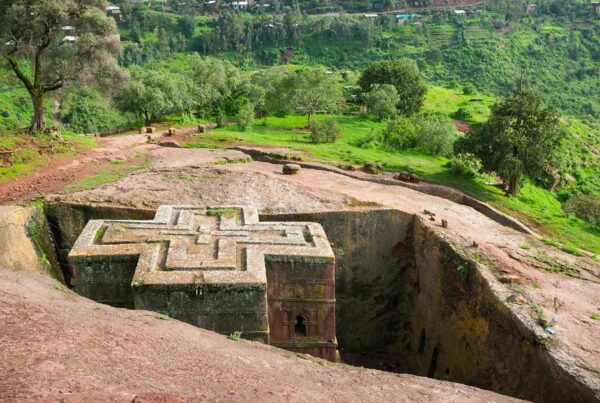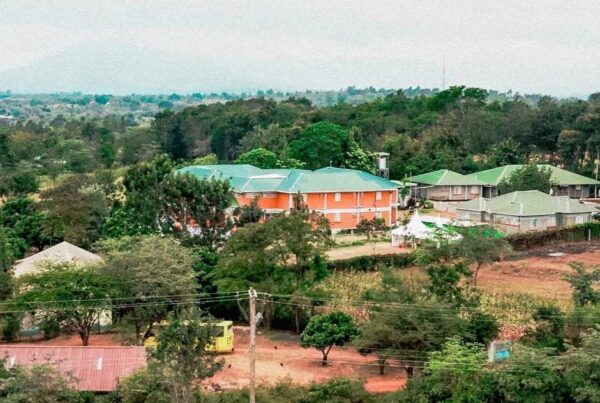At dawn, barefoot pilgrims wind their way through stone-hewn corridors carved nearly a thousand years ago. In silence, they descend into the hollowed courtyards of Bet Giyorgis, the famed cross-shaped church, etched into the rock beneath the Ethiopian highlands. This is not a tourist excursion. This is a pilgrimage.
Across the African continent, Christians are reawakening to the sacredness of travel, not as a leisure activity, but as a spiritual encounter. From the Ethiopian Orthodox traditions in the north to newer evangelical movements in the south, pilgrimage is emerging once again as a tool of discipleship, reconciliation, and revival.
“I thought I came to see the churches,” says Nomsa Dlamini, a South African worship leader visiting Ethiopia for the first time. “But somewhere along the way, I started seeing God in new ways. Pilgrimage strips you down.”

Pilgrimage in Africa is not new. Ancient paths stretch from the Nile Valley’s monastic traditions to the Saharan trade routes where early Christians bore witness. What is new is the renewed interest among younger Christians, especially in the charismatic and Pentecostal streams, for rediscovering the depth of tradition.
In the past decade, more than 2 million Christian pilgrims have travelled within Africa to sites of historic and spiritual significance, according to a 2024 report by the African Faith Tourism Council.
In Uganda, pilgrims walk over 300 km each year in honour of the Ugandan Martyrs, commemorating 45 young Christian converts executed in the late 19th century. The Namugongo Martyrs Shrine outside Kampala sees more than 100,000 people gather on June 3rd each year for prayer, healing, and national reflection.
In Ghana, the Prayer Mountains of Aburi are attracting intercessors and spiritual seekers from West Africa and beyond. Several charismatic ministries have set up waystations for those engaging in 7- or 21-day prayer treks.
In South Africa, spiritual retreats to Morija in Lesotho and historical missions like Genadendal are reviving interest in walking tours that integrate faith, memory, and reconciliation.
“Pilgrimage is not just about where you go,” says Rev. Mbulelo Mkhize, director of the Southern Africa Pilgrimage Network. “It’s about who you become on the journey.”
One growing initiative, “Walk Africa,” founded in 2021 by a pan-African team of pastors and historians, has begun organising multi-day pilgrimage treks across nations, combining prayer, history, and community.
Their flagship route, the Hope Walk, traces a 200-kilometre path through Zimbabwe from Great Zimbabwe ruins to the Mutoko Prayer Centre, integrating local church history with evening revival services along the way. “Young people are signing up by the busload,” says organiser Tatenda Chirwa.
In 2023, the walk saw 3,000 participants, many of whom camped in local villages and shared testimonies in schools and marketplaces. “It’s spiritual formation in motion,” Chirwa adds.
In countries with histories of division and violence, pilgrimage is also being used as a tool for reconciliation. In Rwanda, survivors and descendants of genocide victims have begun prayer walks from Kigali to Butare, stopping at churches that served as both places of refuge and sites of tragedy.
“We do not forget,” says Sister Celeste Mukankusi, who leads a group of interdenominational women walkers. “But we walk to remember rightly — and to choose grace.”
Similar initiatives are emerging in post-conflict zones in northern Mozambique and eastern Congo, where prayer treks are accompanied by trauma healing circles and worship events.
While infrastructure remains a challenge — poor roads, lack of signage, and limited travel insurance — the appetite for faith-based travel is exploding.
The Africa Faith Travel Association estimates that faith-related tourism across the continent will surpass USD 2.5 billion by 2027, with domestic and regional travel far outpacing long-haul pilgrimage to Jerusalem or Rome.
To support this, several nations are investing in spiritual heritage trails. Kenya recently announced a Christian Heritage Circuit that includes sites like Mombasa’s Mission House and Machakos Prayer Mountain. Ghana is expanding tourism around Christian legacy towns in the Volta and Ashanti regions.







